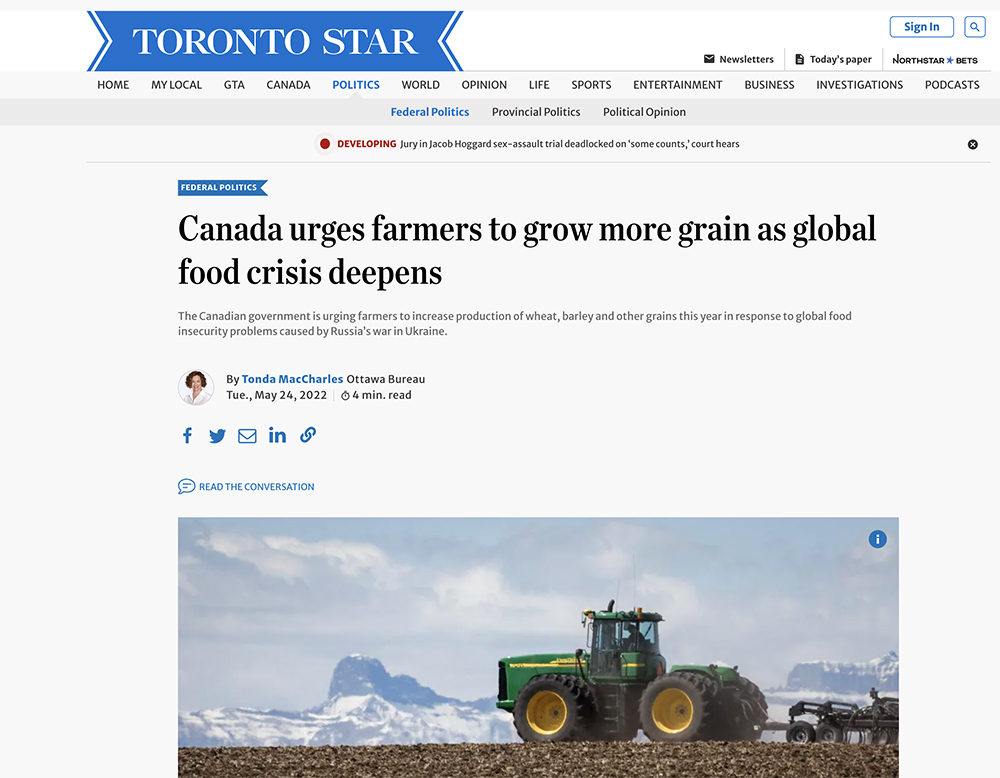The mainstream media has some strange misconceptions about farming and agriculture. With food security becoming a real concern around the world, media outlets that hardly ever do agriculture stories are suddenly interested in farmers.
CTV recently aired a news story about farmers in Atlantic Canada facing dramatically higher diesel fuel and fertilizer prices. Nice of them to notice, but the story had some problems.
First of all, Sylvain Charlebois, the food professor from Dalhousie University, gets called way too often by the media. Sylvain is a great guy and I count him as a friend. If I want to understand something about the food supply chain or supply management policies, he’s the guy to ask.
Read Also

Trump’s trade policies take their toll on Canadian producers
U.S. trade policy as dictated by president Donald Trump is hurting Canadian farmers in a multitude of ways.
But because he’s so accessible, he gets quoted on many basic farm questions on which the answers would best come from others. Just because he’s quotable and articulate shouldn’t make him the go-to interview for everything dealing with agriculture.
In this particular CTV story, the reporter concluded with the statement that farm costs are so high some farmers might not grow a crop this year. Yeah, right. Some farmers might cut back on expensive inputs, but why wouldn’t you do your best to grow a crop with product prices at record levels?
This misconception has been quoted numerous times this spring and seems to have taken on a life of its own.
There was also a recent gem from the Toronto Star where an Ottawa bureau reporter wrote, “the Canadian government is urging farmers to increase production of wheat, barley and other grains this year in response to global food security problems caused by Russia’s war in Ukraine.”
Nothing in the story said who in the Canadian government was doing this urging. Hopefully, nobody in government is that naïve about crop production. We can’t control the weather, but we always try to optimize production based on costs and returns. At current prices, we’d all love to produce a big crop. In many cases, government actions limit what we can do.
If a prominent government official came out with this urging, they’d face all sorts of ridicule.
There are also mainstream media stories that just assume farmers can pass along all their increased costs to consumers. Farmers are paying more for diesel so expect to pay more at the grocery store. The two are related, but it’s a fallacy to think farmers just pass along their increased costs. It’s not like printing up a new restaurant menu with adjusted prices.
The supply-managed sectors are something of an exception, but even in dairy and poultry, it’s a long, convoluted process to recoup increased costs.
We shouldn’t be too hard on mainstream media reporters just trying to do their jobs. Very few have any background in agriculture and most know little about business and economics.
Most of the time, they are sympathetic to the plight of producers, even though they are largely ignorant to the size, scale and dollars involved in modern farming.
Rather than attack misconceptions with a vengeance, it better serves the industry to be patient and explain fully. Agriculture is complicated. It may be tempting to embrace headlines claiming some farmers can’t afford to seed a crop, but that doesn’t increase our credibility.
Agriculture is likely to remain in the mainstream media spotlight for the foreseeable future. We have real concerns to be aired, but we can also do our part to dispel misconceptions when they arise.
Kevin Hursh is an agricultural journalist, consultant and farmer. He can be reached by e-mail at kevin@hursh.ca.
















